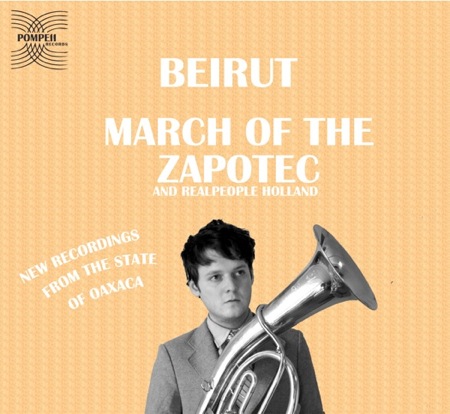 Courtesy Ba Da Bing Records
Courtesy Ba Da Bing RecordsWith his debut album (2006’s ‘Gulag Orkestar’) Condon brought listeners to southeastern
For his latest offering, the ukulele-wielding songwriter decided to take a simultaneous step backward and forward, bringing listeners full circle with the double EP ‘March of the Zapotec /
The first disc, ‘March of the Zapotec,’ is the result of Condon’s recent venture and subsequent experiences in
Following a 30-second instrumental reminiscent of a sideshow circus band the album begins with ‘La Llorona.’ The track sticks to a tested and true formula by layering Condon’s vocals over a simple tuba and trumpet backbeat before cymbal crashes and strings enter the mix to compliment more prominent flourishes of trumpet.
From the songs instrumentation and his unmistakable vocal melodies it is clear from the album’s very incipiency that Condon is not looking to re-invent himself. Instead, he is building on what he already knows, incorporating Mexican flavors into his already robust repertoire of styles.
‘The Akara’ opens with sorrowful sounding trumpet before blending into sad and simple ukulele strums. With a morose tone suited best for a funeral procession, Condon mournfully sings understated lyrics ‘And so long, mistress sings / So long, I can’t wait / To my love / Wait one more.’
Concluding the album is ‘The Shrew.’ The selection offers a welcome break from the weighted instrumentation of the previous cuts with an up-tempo three-step waltz introduction. Ultimately the song revolves around the theme of lost love, however, with Condon quipping: ‘How long she’s been by my side / But at last, the stable’s retired.’ The song masterfully builds into a frantic barrage of horns, accordions and strings before abruptly easing to its original pace.
To say the album ends on a high note is an understatement. ‘The Shrew’ is easily one of the young songwriter’s most accomplished compositions to date; a tantalizing accumulation of several years of worldly travel.
The second disc, ‘
The album’s five tracks are saturated with Condon’s teenage influences. ‘
The EP’s opener ‘My Night with a Prostitute from Marseille’ is nothing new for most fans of the band. The track gained widespread Internet fame following its inclusion on Natalie Portman’s digital-only, charity compilation ‘The Big Change’ and has been floating around various music blogs for some time since.
The album hits its stride on ‘
‘
Whereas ‘March’s’ true strength is in its instrumental arrangements, ‘
ms conceptually flawed, and the finished product does little to prove otherwise.
As a complete package, ‘March of the Zapotec /
Brian Wood can be reached at [email protected].






